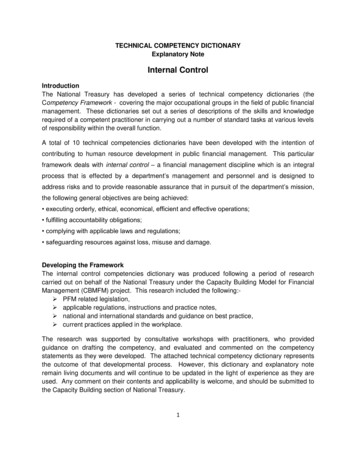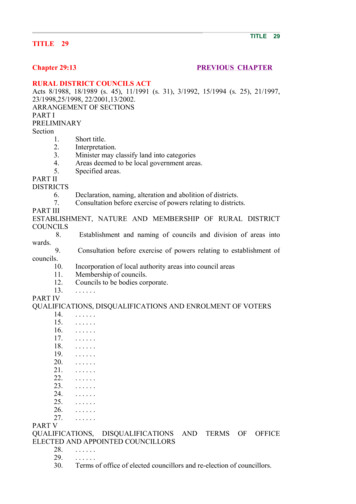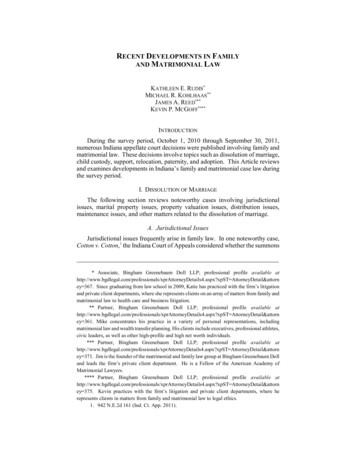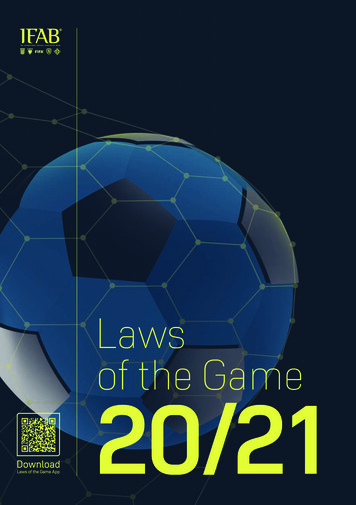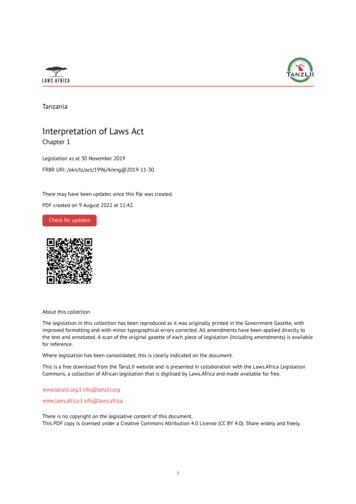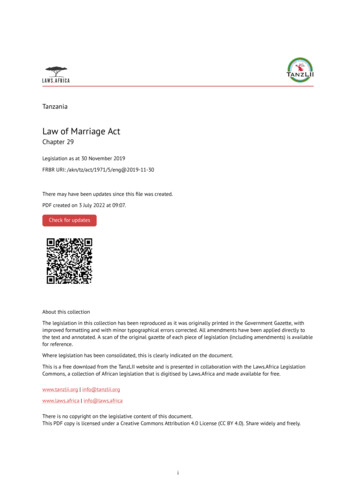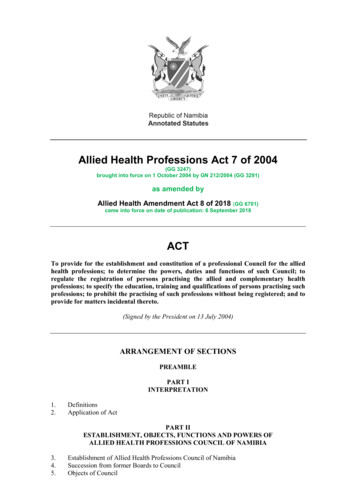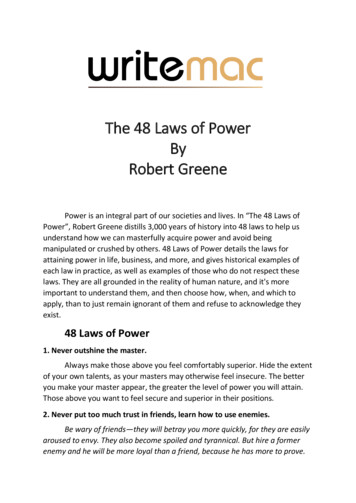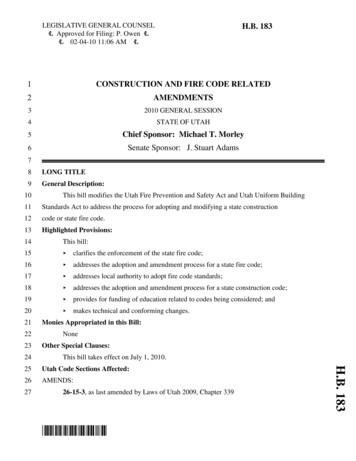
Transcription
MATRIMONIAL CAUSES ACTARRANGEMENT OF SECTIONSPART IJurisdictionSECTION1. Institution of matrimonial causes proceedings only under this Act.2. Jurisdiction in matrimonial causes.3. Void marriages and prohibited degrees of consanguinity.4. Marriage of persons within prohibited degrees of affinity.5. Voidable marriages.6. Validity, etc., of certain marriages not affected.7. Special provisions as to wife's domicile.8. Law to be applied.9. Staying and transferring of proceedings.10. Courts to aid one another.PART IIMatrimonial ring when reconciliation fails.Statements, etc., made in course of attempt to effect reconciliation.Marriage conciliator to take oath of solution of marriageGrounds for dissolution of marriage.Provisions supplementary to section 15.Additional provisions to encourage reconciliation.Constructi ve desertion.Refusal to resume cohabitation.Desertion continuing after insanity.Restriction on finding of non‐consummation.Aggregation of concurrent sentences in reckoning imprisonment.Restriction on finding of non‐maintenance.Restriction on finding of insanity.Power to refuse to make decree without maintenance, etc., in proper case.Condonation and connivance.Collusion.
Matrimonial Causes ActSECTION28. Discretionary bars.29. No dissolution where petition for nullity before court.30. Petition within two years of marriage.31. Claim for damages.32. Joinder of adulterers, etc.33. Effect of dissolution of maniage.34.35.36.37.38.Nullity of marriageGround for decree of nullity of marriage.Who may institute proceedings.Incapacity to consummate maniage.Restrictions on certain grounds.Effect of decree of nullity of a voidable marriage.Judicial separation39. Grounds for judicial separation.40.Application to judicial separation of sundry sections of this Part.41 . Effect of decree of judicial separation.41. Effect on rights to sue, devolution of property, etc.42. Exercise of joint powers not affected.43. Decree of judicial separation not to bar subsequent proceedings for dissolution of maniage.44. Discharge of decree of judicial separation on resumption of cohabitation.45. Application of sections 41 to 45 to certain decrees.47.48.49.50.51.Restitution of conjugal rightsGround for decree of restitution of conjugal rights.Agreement for separation.Sincerity of petitioner.Notice as to home.Enforcement of decree.Jactitation of marriage52. Ground for decree of jactitation of marriage, and discretion of court.53.54.55.56.57.58.59.60.61.GeneralFacts, etc., occurring before commencement of Act or outside Nigeria.Institution of proceedings.Duty of court.Decree nisi in first instance.Decree absolute where children under sixteen years, etc.When decree becomes absolute.Certificate as to decree absolute.Rescission of decree nisi where parties are reconciled, etc.Rescission of decree nisi on ground of miscarriage of justice.62.63.64.65.InterventionIntervention by Attorney‐General on request from court.Intervention of Attorney‐General in other cases.Delegation by Attorney‐General.Intervention by other persons.
66. Rescission of decree nisi in consequence of intervention.67. When proceedings finally disposed of.68. Procedure on intervention.PART lVMaintenance, custody and settlementSECTION69. Interpretation of "marriage", etc., in the application of this Part.70. Powers of court in maintenance proceedings.71. Powers of court in custody, etc., proceedings.72. Power of court in proceedings with respect to settlement of property.73. General powers of court.74. Execution of deeds, etc., by order of court.75. Power of court to make orders on dismissal of petition.PART V76.77.78.79.AppealsGeneral right of appeal.Appeals with leave.Appeal from court of summary jurisdiction.Appellate jurisdiction and powers.PART VIRecognition of decrees80. Effect of decrees.81. Recognition of other decrees.PART VII82.83.84.85.86.87.EvidenceStandard of proof.Evidence of husbands and wives.Evidence of non‐access.Evidence as to adultery.Proof of marriage, etc.Evidence of rape, etc.Matrimonial Causes ActPART VIII88.89.90.91.92.93.94.95.Enforcement of decreesAttachment.Enforcement of decrees by other High Courts.Recovery of moneys as judgement debt.Summary enforcement of orders for maintenance.Enforcement of maintenance orders by attachment of earnings.Enforcement by other means.Enforcement of existing decrees.Power to make rules of court for purposes of this Part.PART IXTransitional provisions96. Definitions.
97. Pending proceedings generally.98. Continuance of proceedings for dissolution or nullity of marriage, or judicial separation.99. Application of this Act to pending proceedings for dissolution or nullity of marriage, orjudicial separation.100. Continuance of other pending proceedings.101. Special provisions as to pending appeals or existing rights to appeal.102. Decrees of restitution of conjugal rights under previous law.PART XMiscellaneousSECTION103. Hearings to be in open court.104. Proceedings to be heard by judge alone.105. Transactions intended to defeat claims.106. Service of process.107. Position of clergy as to re‐marriage.108. Restriction on publication of evidence.109. Injunctions.110. Costs.111. Frivolous or vexatious proceedings.112. Rules of court.113. Savings for sundry domestic and foreign decrees, etc.114. Interpretation.115. Short title.FIRST SCHEDULEProhibited degrees of consanguinity and affinitySECOND SCHEDULEOath or affirmation by marriage conciliatorTHIRD SCHEDULEEnforcement of orders for maintenanceMATRIMONIAL CAUSES ACTAn Act to make provisions for matrimonial causes.[1970 No. 18.][17th March, 1970][Commencement. ]PART IJurisdiction1.Institution of matrimonial cause proceedings only under this Act(1) After the commencement of this Act, a matrimonial cause shall not be institutedotherwise than under this Act.
(2) If a matrimonial cause has been instituted before the commencement of this Actbut not completed, it shall be continued and dealt with only in accordance with the provi‐sions of this Act.(3) Where before or after the commencement of this Act a matrimonial cause hasbeen or is instituted, and whether or not it has been completed, proceedings in relationthereto for any relief or order of a kind that could be sought under this Act shall be insti‐tuted after the commencement of this Act only under this Act, so however that, subject tothe succeeding provisions of this and the next section‐‐(a)any jurisdiction of a court of summary jurisdiction of a State or of a court ofappeal from such a court, under the law of that State, to make—(i) orders with respect to the maintenance of wives or children or the custodyof or access to children; or(ii) separation orders or other orders having the effect of relieving a partyto a marriage from any obligation to cohabit with the other party,shall not be affected by this Act or any proceedings thereunder; and(b)proceedings for or in respect of such an order, or for its enforcement, may becontinued or instituted as if this Act had not been made.(4) Where a marriage is dissolved or annulled by a decree of a court of cornpetent ju‐risdiction under this Act‐(a)any jurisdiction of such a court or of a court on appeal from such a court, tomake orders of the kind specified in subsection (3) (a) of this section shall, byvirtue of this subsection, cease to be applicable in relation to the parties to themarriage or the children of the marriage; andany order of that kind (unless it is a maintenance order, when subsection (6) of(b)this section will apply) made by such a court in relation to those parties orchildren shall cease to have effect.(5) A court in the exercise of its jurisdiction under this Act may at any time by orderdirect that an order of the kind specified in subsection (3) (a) of this section made by acourt of summary jurisdiction, or by a court on appeal from such a court, shall cease tohave effect; and that order shall cease to have effect accordingly.(6) Where an order of the kind specified in subsection (3) (a) of this section madewith respect to the maintenance of a wife or of children ceases to have effect under sub‐section (4) or (5) of this section, the order made may, in so far as it relates to any periodbefore it so ceased to have effect, be enforced as if this Act had not been made.2. Jurisdiction in matrimonial causes(1) Subject to this Act, a person may institute a matrimonial cause under this Act inthe High Court of any State of the Federation; and for that purpose the High Court ofeach State of the Federation shall have jurisdiction to hear and determine‐‐(a)matrimonial causes instituted under this Act; and(b)matrimonial causes (not being matrimonial causes to which section 101 of thisAct applies) continued in accordance with the provisions of Part IX of this Act,so however that jurisdiction under this Act in respect of matrimonial causeswithin this paragraph shall be restricted to the court in which the matrimonialcause was instituted,and in any case where maintenance is ordered in proceedings in a High Court, a court ofsummary jurisdiction in any State shall have jurisdiction to enforce payment in summarymanner.(2) Proceedings for a decree‐‐
(a)(b)(c)(d)(e)(f)of dissolution of marriage; orof nullity of a voidable marriage; orof nullity of a void marriage; orof judicial separation; orofrestitution of conjugal rights; orof jactitation of marriage,may be instituted under this Act only by a person domiciled in Nigeria.(3) For the avoidance of doubt it is hereby declared that a person domiciled in anyState of the Federation is domiciled in Nigeria for the purposes of this Act and mayinstitute proceedings under this Act in the High Court of any State whether or not he isdomiciled in that particular State.3. Void marriages and prohibited degrees of consanguinity(1) Subject to the provisions of this section, a marriage that takes place after thecommencement of this Act is void in any of the following cases but not otherwise, that isto say, where‐either of the parties is, at the time of the marriage, lawfully married to some(a)other person;(b)the parties are within the prohibited degrees of consanguinity or, subject tosection 4 of this Act, of affinity;(c)the marriage is not a valid marriage under the law of the place where the mar‐riage takes place, by reason of a failure to comply with the requirements of thelaw of that place with respect to the form of solemnisation of marriages;(d)the consent of either of the parties is not a real consent because‐‐(i) it was obtained by duress or fraud; or(ii) that party is mistaken as to identity of the other party, or as to the na‐ture of the ceremony performed;(iii) that party is mentally incapable of understanding the nature of the mar‐riage contract;(e)either of the parties is not of marriageable age.(2) The prohibited degrees of consanguinity and affinity respectively on and after thecommencement of this Act shall be those set out in the First Schedule to this Act, andnone other.[First Schedule.](3) A marriage solemnised before the commencement of this Act shall not be void‐able on the grounds of consanguinity or affinity of the parties unless the parties were, atthe time of the marriage, within one of the degrees of consanguinity or affinity set out inthe First Schedule to this Act but nothing in this subsection shall make voidable a mar‐riage that would not, apart from this provision, be voidable.4. Marriage of persons within prohibited degrees of affinity(1) Where two persons who are within the prohibited degrees of affinity wish tomarry each other, they may apply, in writing, to ajudge for permission to do so.(2) If the judge is satisfied that the circumstances of the particular case are so excep‐tional as to justify the granting of the permission sought he may, by order, permit the ap‐plicants to marry one another.
(3) Where persons marry in pursuance of permission granted under this section, thevalidity of their marriage shall not be affected by the fact that they are within the prohib‐ited degrees of affinity.(4) The President may arrange with the Governor of a State for the performance byjudges of the High Court of that State of functions under this section.(5) In this section, "judge" means a judge in respect of whom an arrangement madeunder subsection (4) of this section is applicable.(6) Rules made under section 112 of this Act may make provision for the practiceand procedure in and in connection with applications under this section, and may includeprovision for or in relation to the summoning of witnesses, the production of documents,the taking of evidence on oath or affirmation, and the payment of expenses of witnesses.5. Voidable marriage(1) Subject to this Act, a marriage that takes place after the commencement of thisAct not being a marriage that is void, shall be voidable in the following cases but not oth‐erwise, that is to say, where at the time of marriage‐‐‐‐(a)either party to the marriage is incapable of consummating the marriage;either party to the marriage is‐‐(b)(i) of unsound mind; or(ii) a mental defective; or(iii) subject to recurrent attacks of insanity or epilepsy;(c)(d)either party to the marriage is suffering from a venereal disease in a communic‐able form; orthe wife is pregnant by a person other than the husband.(2) For the purposes of this section, "mental defective" means a person who, owingto an arrested or incomplete development of mind, whether arising from inherent causesor induced by disease or injury, requires oversight, care or control for his own protectionor for the protection of others and is, by reason of that fact, unfitted for the responsibili‐ties of marriage.6. Validity, etc., of certain marriages not affected(1) Save as expressly provided in this Part of this Act, nothing in this Part shall affectthe validity or invalidity of a marriage that took place before the commencement of thisAct.(2) A provision of this Act shall not affect the validity or invalidity of a marriagewhere it would not be in accordance with the rules of private international law to applythat provision in relation to that marriage.7. Special provisions as to wife's domicileFor the purposes of this Act‐(a)a deserted wife who was domiciled in Nigeria either immediately before hermarriage or immediately before the desertion shall be deemed to be domiciledin Nigeria; and(b)a wife who is resident in Nigeria at the date of instituting proceedings underthis Act and has been so resident for the period of three years immediately pre‐ceding that date shall be deemed to be domiciled in Nigeria at that date.
8. Law to be appliedThe jurisdiction conferred on a court by this Act shall be exercised in accordance withthis Act, and any law in force immediately before the commencement of this Act whichconfers jurisdiction in divorce or matrimonial causes on the High Court of a State or pro‐vides for the law and practice to be applied in the exercise of that jurisdiction shall, to theextent that it does so, cease to have effect.9. Staying and transferring of proceedings(1) Where it appears to a court in which a matrimonial cause has been instituted un‐der this Act that a matrimonial cause between the parties to the marriage or purportedmarriage has been instituted in another court having jurisdiction under this Act, the courtmay in its discretion stay the matrimonial cause for such time as it thinks fit.(2) Where it appears to a court in which matrimonial cause has been instituted underthis Act (including a matrimonial cause in relation to which subsection (1) of this sectionapplies) that it is in the interest of justice that the matrimonial cause be dealt with in an‐other court having jurisdiction to hear and determine that cause, the court may transferthe matrimonial cause to the other court.(3) The court may exercise its powers under this section at any time and at any stageeither on application by any of the parties, or of its own motion.(4) Where a matrimonial cause is transferred from a court in pursuance of this sec‐tion‐‐(a)all documents of record filed in that court shall be transmitted by the registraror other proper officer of that court to the registrar or other proper officer ofthe court to which the cause is transferred; and(b)the court to which the cause is transferred shall proceed as if the cause hadbeen originally instituted in that court, and as if the same proceedings had beentaken in that court from which the cause was transferred, but all subsequentproceedings shall be in accordance with the practice and procedure of the courtto which the cause is transferred.10. Courts to aid one anotherAll courts having jurisdiction under this Act shall severally act in aid of and be auxil‐iary to one another in all matters under this Act.PART IIMatrimonial reliefReconciliation11. Reconciliation(1) It shall be the duty of the court in which a matrimonial cause has been institutedto give consideration, from time to time, to the possibility of a reconciliation of the par‐ties to the marriage (unless the proceedings are of such a nature that it would not be ap‐propriate to do so), and if at any time it appears to the judge constituting the court, eitherfrom the nature of the case, the evidence in the proceedings or the attitude of those par‐ties, or of either of them, or of counsel, that there is a reasonable possibility of such areconciliation, the judge may do all or any of the following, that is to say, he may‐(a)adjourn the proceedings to afford those parties an opportunity of becomingreconciled or to enable anything to be done in accordance with either of thenext two succeeding paragraphs;(b)with the consent of those parties, interview them in chambers, with or withoutcounsel, as the judge thinks proper, with a view to effecting a reconciliation;
(c)nominate a person with experience or training in marriage conciliation, or inspecial circumstances, some other suitable person, to endeavour with the con‐sent of the parties, to effect a reconciliation.(2) If, not less than fourteen days after an adjournment under subsection (1) of thissection has taken place, either of the parties to the marriage requests that the hearing beproceeded with, the judge shall resume the hearing, or the proceedings may be dealt withby another judge, as the case may require, as soon as practicable.12. Hearing when reconciliation failsWhere a judge has acted as conciliator under section 11 (1) (b) of this Act but the at‐tempt to effect a reconciliation has failed, the judge shall not, except at the request of theparties to the proceedings, continue to hear the proceedings, or determine the proceed‐ings; and, in the absence of such a request, the proceedings shall be dealt with by anotherjudge.13. Statements, etc., made in course of attempt to effect reconciliationEvidence of anything said or of any admission made in the course of an endeavour toeffect a reconciliation under this Part of this Act shall not be admissible in any court(whether exercising federal jurisdiction or not) or in proceedings before a person author‐ised by any enactment, federal or state, or by consent of parties, to hear, receive and ex‐amine evidence.14. Marriage conciliator to take oath of secrecyA marriage conciliator shall, before entering upon the performance of his functions assuch a conciliator, make and subscribe, before a person authorised in Nigeria to take affi‐davits, an oath or affirmation of secrecy in accordance with the form in the SecondSchedule to this Act.[Second Schedule.]Dissolution of marriage15. Grounds for dissolution of marriage(1) A petition under this Act by a party to a marriage for a decree of dissolution ofthe marriage may be presented to the court by either party to the marriage upon theground that the marriage has broken down irretrievably.(2) The court hearing a petition for a decree of dissolution of a marriage shall holdthe marriage to have broken down irretrievably if, but only if, the petitioner satisfies thecourt of one or more of the following facts‐(a)(b)that the respondent has wilfully and persistently refused to consummate themarriage;that since the marriage the respondent has committed adultery and the peti‐tioner finds it intolerable to live with the respondent;(c)that since the marriage the respondent has behaved in such a way that the peti‐tioner cannot reasonably be expected to live with the respondent;(d)that the respondent has deserted the petitioner for a continuous period of atleast one year immediately preceding the presentation of the petition;(e)that the parties to the marriage have lived apart for a continuous period of atleast two years immediately preceding the presentation of the petition and therespondent does not object to a decree being granted;(if)that the parties to the marriage have lived apart for a continuous period of aleast three years immediately preceding the presentation of the petition;
(g)that the other party to the marriage has, for a period of not less than one year,failed to comply with a decree or restitution of conjugal rights made under hisAct;(h)that the other party to the marriage has been absent from the petitioner for suchtime and in such circumstances as to provide reasonable grounds for presum‐ing that he or she is dead.(3) For the purposes of subsection (2) (e) and (f) of this section the parties to a mar‐riage shall be treated as living apart unless they are living with each other in the samehousehold.16. Provisions supplementary to section 15(1) Without prejudice to the generality of section 15 (2) of this Act, the court hearinga petition for a decree of dissolution of marriage shall hold that the petitioner has satisfiedthe court of the fact mentioned in the said section 15 (2) (c) of this Act if the petitionersatisfies the court that‐(a)since the marriage, the respondent has committed rape, sodomy, or bestiality;or(b)since the marriage, the respondent has, for a period of not less than twoyears‐(i)been a habitual drunkard; or(ii)habitually been intoxicated by reason of taking or using to excess anysedative, narcotic or stimulating drug or preparation,or has, for a part or parts of such a period, been a habitual drunkard and has, for the otherpart or parts of the period, habitually been so intoxicated; or(c)since the marriage, the respondent has within a period not exceeding fiveyears‐(i)(ii)suffered frequent convictions for crime in respect of which the respon‐dent has been sentenced in the aggregate to imprisonment for not less thanthree years; andhabitually left the petitioner without reasonable means of support; or(d)since the marriage, the respondent has been in prison for a period of not lessthan three years after conviction for an offence punishable by death or impris‐onment for life or for a period of five years or more, and is still in prison at thedate of the petition; or(e)since the marriage and within a period of one year immediately preceding thedate of the petition, the respondent has been convicted of‐(i)having attempted to murder or unlawfully to kill the petitioner; or(ii)(f)having committed an offence involving the intentional infliction ofgrievous harm or grievous hurt on the petitioner or the intent to inflictgrievous harm or grievous hurt on the petitioner; orthe respondent has habitually and wilfully failed, throughout the period of twoyears immediately preceding the date of the petition, to pay maintenance forthe petitioner‐(i)ordered to be paid under an order of, or an order registered in, a courtin the Federation; or(ii)agreed to be paid under an agreement between the parties to the mar‐riage providing for their separation; or
(g)the respondent‐(i)is, at the date of the petition, of unsound mind and unlikely to recover;and(ii)since the marriage and within the period of six years immediately pre‐ceding the date of the petition, has been confined for a period of, or forperiods aggregating, not less than five years in an institution wherepersons may be confined for unsoundness of mind in accordance withlaw, or in more than one such institution.(2) Where a petition is based on the fact mentioned in section 15 (2) (h) of this Act‐(a)proof that, for a period of seven years immediately preceding the date of thepetition, the other party to the marriage was continually absent from the peti‐tioner and that the petitioner has no reason to believe that the other party wasalive at any time within that period, is sufficient to establish the fact in ques‐tion, unless it is shown that the other party to the marriage was alive at a timewithin that period; and(b)a decree made pursuant to the petition shall be in the form of a decree of dis‐solution of marriage by reason of presumption of death.17. Additional provisions to encourage reconciliation(1) Where the petitioner alleges that the respondent has behaved in such a way thatthe petitioner cannot reasonably be expected to live with him but the parties to the mar‐riage have lived with each other for a period or periods after the date of the occurrence ofthe final incident relied on by the petitioner and held by the court to support his allega‐tion, that fact shall be disregarded in determining for the purposes of section 15 (2) (c) ofthis Act whether the petitioner cannot reasonably be expected to live with the respondentif the length of that period or of those periods together was six months or less.(2) In considering for the purposes of section 15 (2) of this Act whether the period forwhich the respondent has deserted the petitioner or the period for which the parties to amarriage have lived apart has been continuous, no account shall be taken of anyone pe‐riod (not exceeding six months) or of any two or more periods (not exceeding six monthsin all) during which the parties resumed living with each other, but no period duringwhich the parties lived with each other shall count as part of the period of desertion or ofthe period for which the parties to the marriage lived apart, as the case may be.(3) References in this section to the parties to a marriage living with each other shallbe construed as references to their living with each other in the same household.18. Constructive desertionA married person whose conduct constitutes just cause or excuse for the other party tothe marriage to live separately or apart, and occasions that other party to live separatelyor apart, shall be deemed to have wilfully deserted that other party without just cause orexcuse, notwithstanding that that person may not in fact have intended the conduct tooccasion that other party to live separately or apart.19. Refusal to resume cohabitation(1) Where husband and wife are parties to an agreement for separation, whether oral,in writing or constituted by conduct, the refusal by one of them, without reasonable justi‐fication, to comply with the other's bona fide request to resume cohabitation shall con‐stitute, as from the date of the refusal, wilful desertion without just cause or excuse on thepart of the party so refusing.
(2) For the purposes of this section, "reasonable justification" means justificationthat is reasonable in all the circumstances, including the conduct of the other party to themarriage since the marriage, whether that conduct took place before or after the agree‐ment for separation.20. Desertion continuing after insanityWhere a party to a marriage has been wilfully deserted by the other party, the deser‐tion shall not be deemed to have been terminated by reason only that the deserting partyhas become incapable of forming or having an intention to continue the desertion, if itappears to the court that the desertion would probably have continued if the desertingparty had not become so incapable.21. Restriction on finding of non‐consummationThe court shall not find that a respondent has wilfully and persistently refused to con‐summate the marriage unless the court is satisfied that, as at the commencement of thehearing of the petition, the marriage had not been consummated.22. Aggregation of concurrent sentences in reckoning imprisonmentWhertr‐(a)a person has been sentenced to imprisonment in respect of each of two or morecrimes that, in the opinion of the court hearing the petition, arose substantiallyout of the same acts or omissions; and(b)the sentences were ordered to be served, in whole or in part, concurrently,then in reckoning for the purposes of section 16 (1) (c) of this Act the period for whichthat person has been sentenced in the aggregate, any period during which two or more ofthose sentences were to be served concurrently shall be taken into account once only.23. Restriction on finding of non‐maintenanceA finding in accordance with section 16 (1) (f) of this Act shall not be made unless thecourt is satisfied that reasonable attempts have been made by the petitioner to enforce theorder or agreement under which maintenance was ordered or agreed to be paid.24. Restriction on finding of insanityA finding in accordance with section 16 (1) (g) of this Act shall not be made unlessthe court is satisfied that, at the commencement of the hearing of the petition, the respon‐dent was still confined in an institution referred to in the said section 16 (1) (g) and wasunlikely to recover.25. Power to refuse to make decree without maintenance, etc., in proper caseOn the application of the respondent made in the course of proceedings for a decree ofdissolution of marriage, the court may, if it considers it just and proper in the circum‐stances of the case to make provision for the maintenance of the respondent or other pro‐vision for the benefit of the respondent, refuse to make a decree unless and until it is sat‐isfied that the petitioner has made arrangements satisfactory to the court to provide themaintenance of other benefit as aforesaid upon the decree becoming absolute.26. Condonation and connivanceExcep
(1) Subject to the provisions of this section, a marriage that takes place after the commencement of this Act is void in any of the following cases but not otherwise, that is to say, where‐ (a) either of the parties is, at the time o
